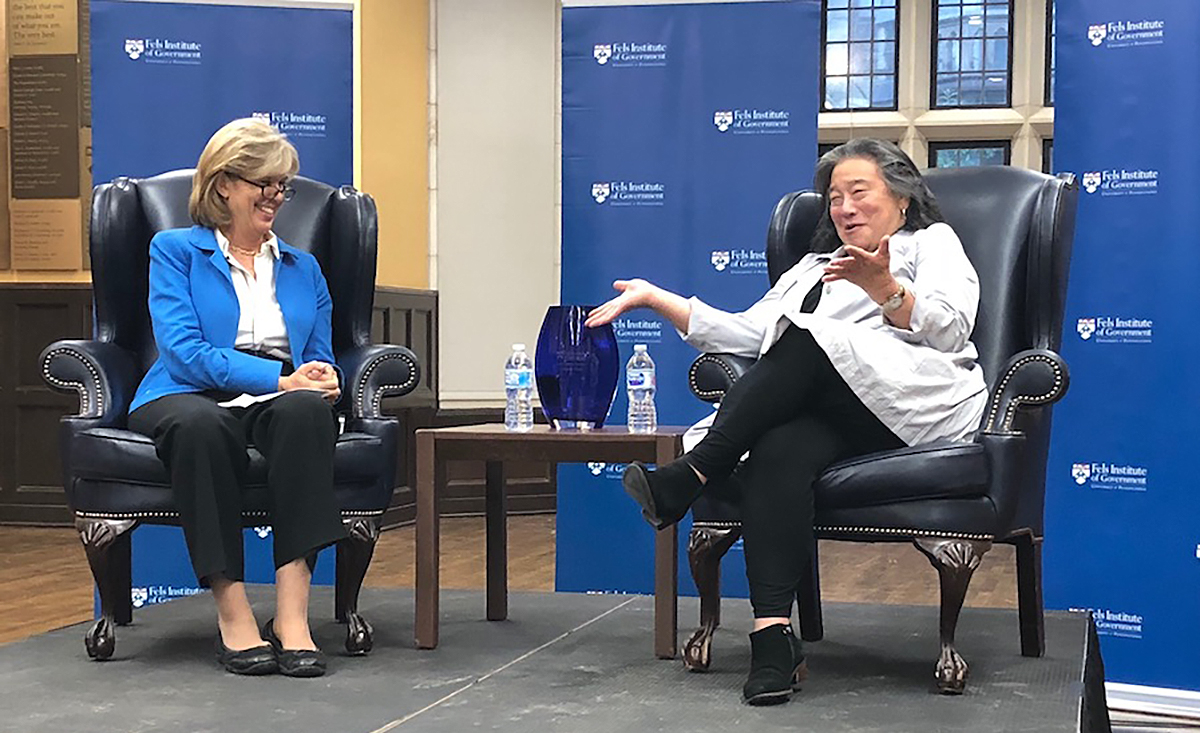The Fels Institute of Government has new faculty leaders, but many traditions are staying put, including the institute’s signature Public Policy in Practice workshops.
That’s because the series, led by Fels Distinguished Fellow Elizabeth Vale, fits neatly in place with the 82-year-old Institute’s focus on providing students with an analytical, personal, and practical program in public administration, says John Lapinski, who co-directs Fels with Matthew Levendusky.
“Elizabeth’s series is a great example of the practical,” says Lapinski, who is also the Robert A. Fox Leadership Professor of Political Science at Penn, as well as the faculty director of the Robert A. Fox Leadership Program, and the Program on Opinion, Research, and Election Studies. “She’s essentially opened up her Rolodex to us to bring in these top-level practitioners to come and spend the day with students at Fels.”
Since its inception in 2016, the series has brought in the likes of Marty Baron, executive editor of The Washington Post; former Florida Gov. Jeb Bush; Valerie Jarrett, senior advisor to President Barack Obama; billionaire philanthropist David Rubenstein; and Tina Tchen, CEO of Time's Up and Michelle Obama’s former chief of staff.
The guests have lunch with a small group of Fels students for an in-depth conversation, give an interview to Wharton’s Sirius radio show, and then return for the signature event—a broad, yet intimate conversation moderated by Vale followed by an audience Q&A session. Depending on the topic, other campus centers with related interests will be invited to participate.
The series is designed to provide students with a variety of perspectives and personal narratives that will help them not only form their opinions on important issues but also help shape their careers.
“Fels is full of amazing students doing really admirable things,” says Vale, a distinguished fellow at Fels and senior fellow at Wharton. “For me to be part of what hopefully inspires them is an honor, particularly sharing such accomplished role models who have had public and private sector careers.”
Vale is no stranger to the transition from private to public sector. After a career at Morgan Stanley, where she was a managing director, she moved into a number of high-profile public sector positions, including executive director of the White House Business Council under President Obama. She was also the inaugural director of the Division of External Affairs at the Consumer Financial Protection Bureau and then senior advisor to Elizabeth Warren on her 2012 U.S. Senate campaign.
Fels is also focusing on the practical by assigning a mentor to every student and by offering rigorous analytical training, Lapinski says.
“The data sciences have become so important in the private sector that they’re equally important in the public and nonprofit sector,” Lapinksi says. “We needed to make sure we brought this type of teaching into the program.”
And because each cohort has about 30 students, the participants get personalized, individual attention and forge bonds with not just their cohort but with all students. Many alumni speak of lifelong bonds with their cohorts.
“In some ways, students get the best of a small, top-flight liberal arts college and also the benefits of being at a major research university,” Lapinski says. “When you pull those two together, it’s a unique experience and very good for our students.”
The tradition of offering best-in-class practitioners as part of the teaching faculty remains in place, and three new professors of practice have been brought on board: Michael DiBerardinis, former managing director of the City of Philadelphia who’s been involved with every level of government over his decades-long career; Marci Hamilton, Robert A. Fox Leadership Program Professor of Practice, who is also the founder and CEO of CHILD USA, a nonprofit think tank dedicated to preventing child abuse; and Lauren Russell, a behavioral economist who previously ran the Nelson A. Rockefeller Center at Dartmouth.
DiBerardinis’ course this semester gave students the opportunity to work on three top city initiatives in Philadelphia: zero waste, the opioid crisis, and “Rebuild,” which works to improve facilities around the city.
“Managing is no longer enough,” DiBerardinis says. “There is a call for leadership to really put their arms around these questions and make real progress. Improving educational outcomes, building a more sustainable city, reducing poverty. That all takes leadership. Cities all across America are declaring really ambitious policy objectives, and we were looking at them in Philadelphia.”
The class took a look inside the risk assessment and politics of trying to move those three case studies forward, he says. “It’s really trying to look at public administration through a leadership lens. What are the risks and what are the imperatives?”
The Institute has been focused on turning outward and engaging in thoughtful leadership around public policy. In May, Fels hosted a major forum on the opioid crisis, working with The Pew Charitable Trusts and the city’s health department on instigating dialogue and policies that would shrink the availability of prescription drugs.
In January, Fels will cohost Philadelphia Mayor Jim Kenney’s policy vision conference, which will focus on laying out some of the mayor’s second-term policy priorities.
The approach at Fels might be on the analytical, practical, and personal, but Levendusky says he likes to add another “P” to the mix: Philadelphia.
“Fels has always played a unique role in Philadelphia, ever since Samuel Fels started it over eight decades ago, and we are excited to build on that and make it even stronger,” Levendusky says. “We want to continue to make this a great place in Philadelphia and the region to study public administration and build the public sector leaders of tomorrow.”








